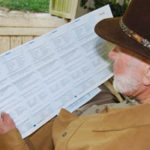
It was 5 p.m. in the lobby of the library of Metropolitan State University, and Clara Ware was sitting behind a table covered with pens, notepads, and buttons with the Census 2010 logo, calling out like a sideshow barker.
“Here comes a prospect,” she said as a student walked up.
Ware explained that filling out the census form this spring could mean more money for the university and the surrounding neighborhood, one of the oldest and most diverse in the city. The student took some knickknacks and promised to fill out her form. Ware smiled.
“If we could get some more of that funding back, we could get some more services,” said Ware, 48, a member of the commuter school’s Student Senate who is among a group that has been pushing the census in classrooms, lobbies, and hallways.
Colleges, universities, and their surrounding communities have a financial interest in making sure all of their students get counted in the census, so public relations campaigns like the one at Metropolitan State are popping up all over the country.
The stakes are high. The government uses census data to apportion seats in Congress and dole out about $400 billion annually in federal funds. It’s also used in federal tuition grant and loan programs, so a thorough count of college students in 2010 can mean more money for higher education in the state down the road.
At a Missouri technical university, students are handing out census-branded screwdriver sets. At the University of Texas’ Arlington campus, students have posted a census-themed parody of the popular MTV show “The Real World” on the web. At Kent State University in Ohio, a student team pushing the census is planning to hit off-campus bars later this month to stamp the address of their Facebook page on the hands of revelers.
And at the University of California at Berkeley, some students will be entered in a raffle to win textbooks when they turn in their census forms.
Still, it’s not an easy sell, said Marty Takimoto, a marketing professor and chairman of a committee working to get Berkeley students counted. “College students are notoriously bad at filling out forms of any sort,” he said.
The efforts are particularly intense in states on the edge of gaining or losing a U.S. House seat depending on how well they do in the census. Election Data Services, a Virginia firm that crunches census numbers, lists Minnesota, Texas, Missouri, and California among those states.
“Some of the states that are on the bubble, and Minnesota is right on the edge of that bubble, have certainly put a lot of effort into it,” said Dennis Johnson, director of the Census Bureau’s regional office in Kansas City, Mo.
The Census Bureau doesn’t estimate how many college students went uncounted in 2000, and to be sure, they’re only one of many groups getting special attention this year. Many states will make extra efforts to reach the homeless, non-English speakers, immigrants, and other groups.
Nor are all colleges pushing the census equally hard. Even within a single system, some campuses are more aggressive than others.
Under Census Bureau rules, students should be counted where they live and sleep most of the year—which means where they go to school, including foreign students.
Johnson said one big problem with counting college students is timing. The census forms are mailed in March and April, which means they can arrive while students are distracted by spring break or final exams.
The free census screwdriver sets are being handed out at the Missouri University of Science and Technology in Rolla, but it’s not the only gambit. John Petersen, the city’s community development director, plans other giveaways and repeated eMail blasts.
“Some might think it’s overkill, but we’re doing enough that hopefully they will get sick and tired of it and just fill it out and send it in,” Petersen said.
Texas is already looking at picking up three House seats, but a thorough count of college students and illegal immigrants could get it to four, state Demographer Karl Eschbach said.
At the University of Texas at Arlington, residence hall staff will chase 4,500 residents who live in campus dorms to fill out their forms. But public-relations students are helping, too, as part of a national contest to promote the census sponsored by the Public Relations Student Society of America (PRSSA).
Besides the “Real World” web parody, the Arlington team is passing out candy bars and other snacks with census information printed on the labels. They also plan a contest where students will race each other to fill out giant forms mounted on easels to drive home the idea that it should take less than 10 minutes.
“Maybe they would see it’s not that difficult,” said Kathelin Buxton, a senior who is part of the effort at Arlington.
At Kent State University in Ohio, Rachel Polchek, 21, and her PRSSA team plan to hit the off-campus bars at the end of February for their census campaign. They intend to stamp the address of their Facebook page, 2010 U.S. Census-Kent State University, on the hands of revelers at Kent’s Cabin Fever weekend.
“When they wake up, they’ll see it,” she said.
Links:
US Census Bureau, counting students
University of Texas-Arlington, Public Relations Student Society of America site
University of California, Berkeley census site
- Research: Social media has negative impact on academic performance - April 2, 2020
- Number 1: Social media has negative impact on academic performance - December 31, 2014
- 6 reasons campus networks must change - September 30, 2014
